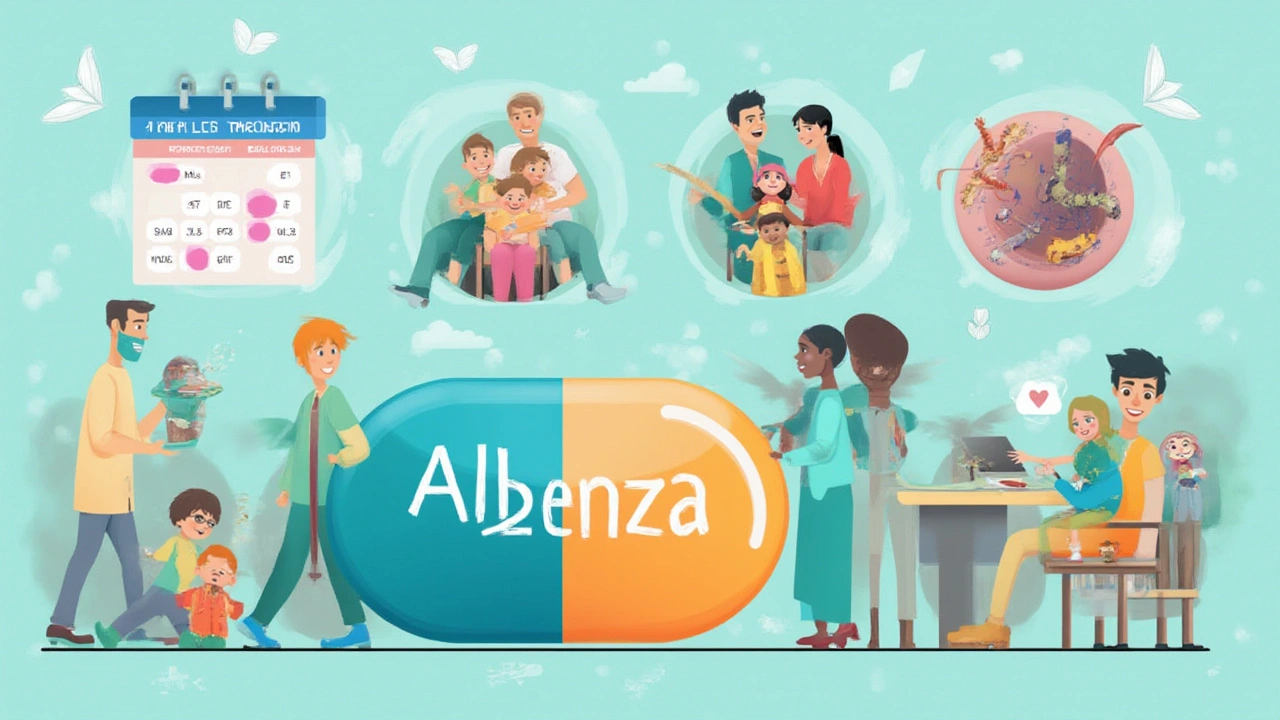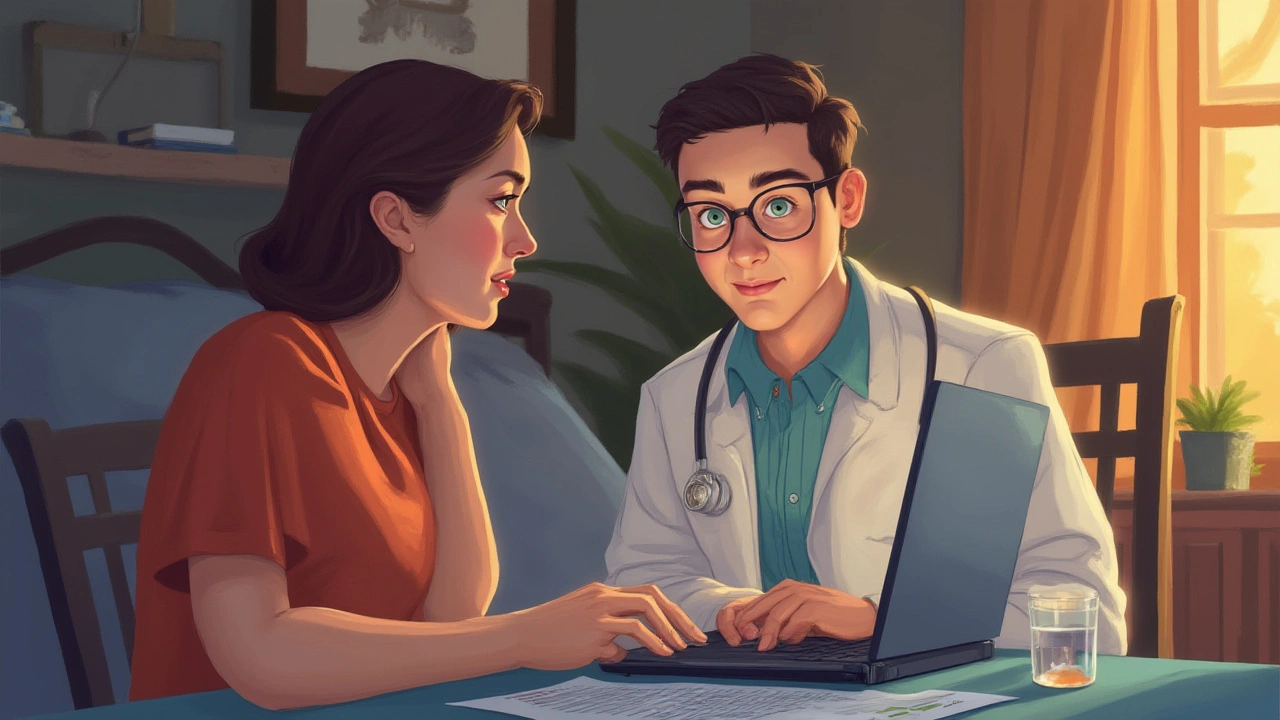Albenza Medication: Uses, Side Effects, Dosage, and Safety Guide
 Jun, 28 2025
Jun, 28 2025
Ever heard of a drug that can sweep away some of the nastiest parasites hiding in your body? That’s Albenza for you—a medication that often flies under the radar until you’re searching for a way to tackle stubborn worms. It might not have the fame of antibiotics, but it’s a workhorse in the world of infectious disease. If you’ve ever been faced with a prescription for Albendazole (that’s Albenza’s generic name), you want the real story on what it does, how safe it is, and why doctors trust it for everything from pinworms to tapeworms. Get ready for a close-up look that cuts through scary rumors and confusing medical speak.
What is Albenza and How Does It Work?
Albenza, or Albendazole, is a potent antiparasitic. It’s been saving people from worm infections since the FDA green-lit it in 1996. But its roots trace back further—scientists at SmithKline Beecham (now GlaxoSmithKline) discovered it in the late 1970s. Albenza is not your run-of-the-mill dewormer. Hospitals count on it to treat things like neurocysticercosis (pork tapeworm infection in the brain—yes, that’s a thing) and hydatid disease (caused by nasty dog tapeworms that form cysts, often in the liver).
The main magic trick? Albenza blocks the parasite’s cells from absorbing glucose. No sugar for the bugs means no energy, and pretty soon, the worms are dead in the gut. Unlike some older remedies, it doesn’t paralyze the worms—it starves them. That’s a big deal, especially for infections that hide outside the intestines, like in the liver or even the brain.
Doctors trust Albenza because it’s broad-spectrum, meaning it works on a bunch of different parasites. Here’s a quick peek at some of the bugs it boots out:
- Neurocysticercosis (pork tapeworms in your brain)
- Hydatid disease (dog tapeworms, Echinococcus granulosus and Echinococcus multilocularis)
- Pinworm, roundworm, hookworm, whipworm (think of childhood, sandpits, and shoes-off season)
- Strongyloidiasis (threadworm infection)
- Some giardia infections
Parasites sound like tropical-only worries, but U.S. studies say millions carry hidden parasitic infections—often without symptoms for years. The CDC puts soil-transmitted helminth (worm) infections at about 1.5 billion worldwide, mostly in places where plumbing isn’t a sure thing.
Since Albenza is a prescription drug, using it right is crucial. Dose, timing, length of treatment, and accompanying food (yes, a fatty meal makes it work better) all play a role.
| Parasite Treated | Recommended Dose (Adult) | Typical Duration |
|---|---|---|
| Neurocysticercosis | 400 mg twice daily | 8-30 days |
| Hydatid disease | 400 mg twice daily | 28-day cycles (with 14-day breaks) - 3 cycles |
| Pinworm/roundworm | 400 mg, single dose | 1 dose, may repeat in 2 weeks |
| Strongyloidiasis | 400 mg daily | 3 days |
Unlike some meds that target only gut bugs, Albenza absorbs from the gut and travels through the body. That’s why it knocks out cysts even in remote spots like the brain or liver. But it also means your liver works harder, which is why doctors sometimes check your liver enzymes or blood counts before and during treatment—especially for long courses.
Fun fact: Albenza is on the World Health Organization’s List of Essential Medicines. The global need for it is massive—partly because, without treatment, some worm infections can lead to seizures, blindness, or severe organ damage.

Side Effects, Warnings, and What to Watch For
Let’s get real—every drug has its quirks, and Albenza isn’t different. Most people do fine, but a few run into side effects. Luckily, the common ones are usually mild and temporary. Think headache, stomach pain, nausea, dizziness, or mild fever. A lot of folks describe it as feeling like a mild bug or hangover, and it usually fades fast. The key trick is to take Albenza with food, which amps up how well your body absorbs it and helps cushion your stomach.
Then there are the rarer, but more serious issues. Albendazole can push your liver to work overtime, especially if you’re on it for weeks. Doctors check your liver numbers (like ALT, AST) before you start, then sometimes every two weeks if you’re on a longer course. If you deal with unusual tiredness, yellowing skin, or dark urine, it’s smart to call your doctor fast. Blood cell counts can also take a hit (think white cells), which is important if you already have immunity problems or you get sick easily.
Watch out for:
- Very bad headache or vision changes
- Unusual bruising or bleeding
- Severe rash, itching, or swelling (face/throat)
- Shortness of breath
- Abdominal pain that doesn’t go away
Pills and pregnancy usually don’t mix. Albenza is a no-go for pregnant folks, especially in the first trimester—animal studies showed risk of birth defects. The CDC strictly advises a pregnancy test before starting if you could become pregnant. For lactating moms, tiny amounts show up in breastmilk, so doctors weigh risks and benefits here too.
Drug interactions? Albenza plays with a few. Cimetidine and dexamethasone (steroids) can boost albendazole levels, which sometimes doctors actually want for tough infections. Grapefruit and grapefruit juice may also hike up drug levels—so skipping those is smart. Always mention supplements or herbal stuff to your pharmacist; even St. John’s Wort can throw off drug levels and make Albenza less effective.
A tip—keep your phone close for reminders if you’re on a multi-dose schedule. Missing doses means those tough worms can come back even stronger. For the quick-fix infections like pinworm, a repeat dose in two weeks bats down any newly hatched eggs.
Insurance coverage can be a pain. Albenza got super pricey in the USA (as much as $200 per pill in the late 2010s), though generics dropped the chalky-white tablets closer to $6-15 a pop by 2024. If insurance balks, ask your doctor about splitting tablets, using a generic, or finding patient assistance programs.
Here’s something the textbooks rarely tell you—some parasites can trigger super strong allergic reactions as they die. Doctors might pair Albenza with steroids (like prednisone) to control swelling and brain pressure, especially for tapeworms in the brain. That way, you get rid of the worms without sending your immune system into meltdown.
According to the Infectious Diseases Society of America, "Standardized protocols for monitoring liver functions and blood counts while on Albendazole have improved outcomes and minimized severe side effects."
About 90% of folks using Albenza for short courses report little to no side effects, but staying alert is wise—especially if you have kidney, liver problems, or you’re immunocompromised.

Tips for Safe and Effective Use of Albenza
If you’re standing in the pharmacy line with that new bottle of Albenza, here’s what you wish someone had told you:
- Take it with fatty food—think cheese, eggs, avocado. A slice of pizza works better than an apple. Fatty meals can double or triple absorption for some folks.
- If your doc says so, get regular blood and liver tests. Jot the schedule in your phone—those calendar reminders really help.
- Don’t skip doses. If you forget, take it as soon as you remember—unless it’s almost time for the next one, then just skip the missed one.
- Don’t pair with grapefruit or grapefruit juice.
- No alcohol while taking Albenza—it’s just asking for more stomach upset and can stress your liver.
- Store at room temperature; leave it in a safe, dry spot—not the bathroom.
Kids can take Albenza, but doctors tweak the dose by weight. Grandparents? Sometimes the liver isn’t as robust, so docs go slower. And yes, pets get albendazole too, but don’t even think about using your own Rx on Fluffy or Fido or vice versa—different metabolisms, different doses.
Good hygiene is your friend during any deworming treatment. Wash your hands after using the bathroom and before eating, keep nails trimmed, change bedding and underwear daily until the treatment’s done, and high-temp wash linens. For pinworms, it’s a full-on family event—everyone gets treated, even if only one person is itchy at night.
Sometimes, stools might change color or you could spot worm segments. Gross, but a sign it’s working. Rarely, neurocysticercosis can look worse at first on brain scans (more swelling), but that’s actually dead parasites—docs look for this and use steroids to keep things calm.
A quirky tip: If you deal with strongyloidiasis and plan to travel, always get treatment right away before using immunosuppressant drugs. Unchecked infections become life-threatening if your immune system is suppressed.
Check with your insurance for coverage—generic albendazole isn’t always carried by all pharmacies, so calling ahead (or even using a pharmacy finder app) saves hassle. Some travel clinics keep stock in-house if you’re heading to an at-risk area.
A closing thought—while no medication is risk-free, Albenza is one of the best tools modern medicine has for fighting parasitic infections. Used thoughtfully, with a little planning and real-world advice, it turns what used to be a terrifying diagnosis into a manageable detour—not a disaster.
Courtney Mintenko
July 4, 2025 AT 05:45Sean Goss
July 4, 2025 AT 22:43Khamaile Shakeer
July 5, 2025 AT 17:14Suryakant Godale
July 5, 2025 AT 23:41John Kang
July 7, 2025 AT 14:13Bob Stewart
July 9, 2025 AT 13:49